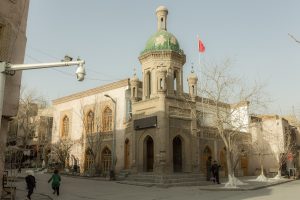In a world filled with choices for globetrotting adventures, the shadow of ongoing atrocities should make the Uyghur homeland a “no go zone” for international travel companies and their customers. The narrative that China now projects about a “Beautiful Xinjiang” – an image of a “cleansed” people and landscape open for exploration – is one that demands an ethical reckoning.
I was stunned to come across tours to the Uyghur homeland being offered to international visitors, amid the post-pandemic opening for international travel to China. I did some digging and found seven different travel companies with eight different itineraries, including some offering “luxury” travel.
For ordinary tourists, taking a holiday amidst such suffering should be off the table. For international travel companies, there’s the additional shame of ignoring calculated erasure of a people’s heritage for economic gain. The time has come for these firms to stop arranging tours to the Uyghur region and to embrace their self-declared role as ethical actors in the global community.
The sites featured on tour itineraries, from Kashgar to Turpan and Ürümchi, are indelibly linked to unfolding tragedies. Heart-rending witness testimony and satellite imagery confirm that the entire Uyghur landscape is scarred by the obliteration of cultural treasures, while in the background the government carries out high-tech racial profiling, birth prevention, large-scale forced labor, and imprisonment of Uyghurs and other Turkic peoples.
The companies’ sales pitches to customers perpetuate China’s propagandist depictions of an “exotic” population, reducing the profound suffering of these communities into mere consumable experiences for tourists. Some tours even hype, as a special feature, a visit to Uyghur homes. In an environment of total surveillance and state control, it’s impossible to guarantee that these tours are not exploiting families who must put on a happy face lest the police “disappear” them for saying the wrong thing to a foreign visitor.
Even self-described “mindful” and “responsible” travel companies appear to be indifferent to the possibility that a tour to the Uyghur region is a “Genocide Tour.” Despite compelling evidence of atrocities, companies, including Abercrombie & Kent, continue to offer travel itineraries for purchase.
A March 2023 Times of London article lauding travel to China’s Silk Road recommended specific tours available through U.K.-based Bamboo Travel and Australian outfit Intrepid Travel. After Helen Davidson of The Guardian covered the Uyghur Human Rights Project’s findings, Intrepid Travel and Goway pulled the listings from their websites. However, representatives at Bamboo argued that ending tours is “cutting the revenue streams that tourism provides to locals.” Notably, their promotional literature neither evidences how Uyghurs benefit directly, nor mentions that their customers are accommodated in hotels that are owned by the state.
Today, visits to Auschwitz-Birkenau in Poland and Choeung Ek in Cambodia are solemn reminders of “never again.” However, the tours to the Uyghur region, as curated by international travel companies, offer no such lessons. As much as it would test ethical limits to take a tour to Cambodia under the Khmer Rouge, or Rwanda or Darfur in the midst of the atrocities in these places, the same applies to the Uyghur homeland.
By bringing tourists to the Uyghur region, travel companies tacitly whitewash genocidal policies, profit from hyper-securitization, and deny Uyghurs their right to freely express and develop their cultural heritage. These optics belie the declarations of corporate values and social responsibilities found on company websites. For example, Wild Frontiers claimed, “We are very aware of the economic, ecological and ethical impact tourism can have on ancient cultures and fragile environments.” To exiled Uyghurs, unable to speak to their families for years or return home without fear of detention, this ethical outlook on tourism looks decidedly compromised.
But it’s not just Uyghurs’ feelings at stake. These tours are completely out of line with the standards of the United States Tour Operators Association and the global Framework Convention on Tourism Ethics.
The normalization of genocide and crimes against humanity in the Uyghur region is beyond troubling. When overseas visitors traverse cleansed landscapes, that’s complicity in grave injustices. Travel companies shouldn’t be running tours through a genocide.
































